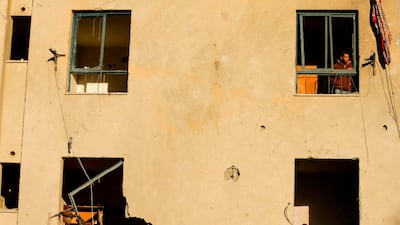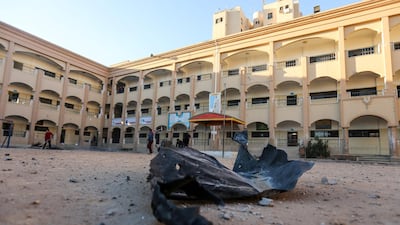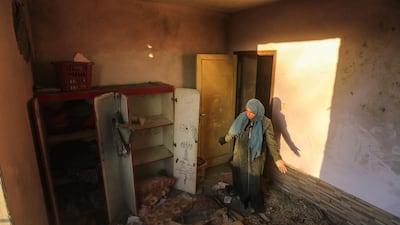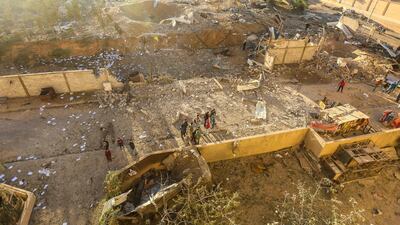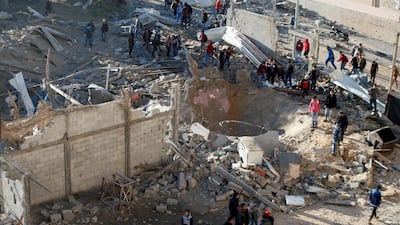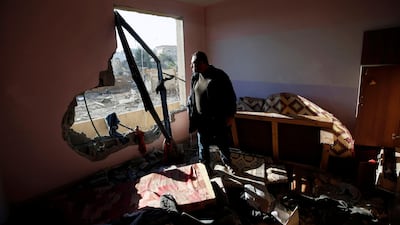Israeli air strikes on Gaza killed two Hamas members on Saturday following a rocket attack on Israel, in the latest fallout from US president Donald Trump's decision to recognise Jerusalem as Israel's capital.
The Israeli military said it targeted four Hamas warehouses and weapons manufacturing sites in response to three rockets fired the previous night, including one that landed in the town of Sderot without causing casualties or major damage. Hamas said it had recovered the bodies of two of its men after the pre-dawn strike on a base in Nusseirat in the central Gaza Strip.
A previously unknown Salafist group calling itself the Salahedin Brigades claimed responsibility for one of the attacks, but Israel hold Hamas responsible for all "hostile activity" from Gaza, which is under its control.
Mr Trump's announcement on Jerusalem, and his intention to move the US Embassy there, triggered denunciations from around the world, with even close allies suggesting he had needlessly stirred more conflict in an already volatile region. The status of the city lies at the core of the Israeli-Palestinians conflict, and Mr Trump's move was widely perceived as siding with Israel.
Foreign ministers of the Arab League were holding an emergency meeting in Cairo on Saturday night to formulate a response. A spokesman said they were expected to announce measures to “defend occupied Jerusalem and its legal, historical and religious status”.
The US move was widely criticised at a special meeting of the UN Security Council on Friday. Traditional US allies on the council, including Britain, France, Sweden, Italy and Japan, all insisted that Jerusalem's status must remain unresolved until final Israeli-Palestinian negotiations.
In a joint statement, ambassadors from France, Italy, Germany, Sweden and Britain said Mr Trump's decision was "not in line with Security Council resolutions and is unhelpful in terms of prospects for peace in the region".
Most countries have not recognised Israel's 1967 annexation of east Jerusalem and maintain their embassies in Tel Aviv. Under a longstanding international consensus, the fate of the city is to be determined in final status peace negotiations.
Palestinian official Hanan Ashrawi said the council took a strong stance against "American violations of international law".
"They have no mandate to give away Jerusalem to an occupying power or to violate international law in such a blatant and egregious manner," she said.
Announcing his decision on Wednesday, which makes good on a presidential campaign pledge, Mr Trump said it marked the start of a "new approach" to solving the Israeli-Palestinian conflict. However, his administration has released no details of its plans to achieve peace.
In response to Mr Trump's move, Palestinian president Mahmoud Abbas, the grand imam of Al Azhar mosque in Cairo and the head of Egypt's Coptic church all cancelled planned meetings with US vice president Mike Pence during his visit to the region later this month.
"There will be no meeting with the vice president of America in Palestine," Mr Abbas's diplomatic adviser Majdi Al Khaldi said. "The US crossed the red line in its decision about Jerusalem."
The Al Azhar’s grand imam Ahmed Al Tayyeb said Mr Trump and his administration "should bear full responsibility for inciting hatred in the hearts of Muslims and the hearts of all advocates of peace in the world”, while a spokesman for Pope Tawadros II said he had cancelled his meeting with Mr Pence because "now is not a suitable time for such an audience because of the hurt feelings of millions of people in Egypt and the region".
Palestinian protests over the US decision continued across the West Bank and Gaza on Saturday, on the third and final "day of rage" following Mr Trump's announcement. In the Gaza Strip, about 450 Palestinians clashed with Israeli troops at eight main locations. Demonstrations resumed in Pakistan, Turkey and elsewhere across the Muslim world as well.
In Jerusalem, police forces — some on horseback — scuffled with protesters near the Old City and arrested six people who were involved in what they called an illegal protest. Two policemen were injured.
"President Trump cannot take what he doesn't have," said Zuheir Dana, one of the protesters from east Jerusalem, which the Palestinians consider to be the capital of their future state.
______________
Read more
Two Palestinians killed during protests over Trump's Jerusalem move
Israeli minister: Trump 'hint' at Jerusalem partition with Palestinians
______________
Israel has mobilised troops in case further violence breaks out, although the clashes in the West Bank and East Jerusalem have yet to claim lives or spiral into the kind of violence some had feared.
The flare-up followed clashes Friday between Palestinian protesters and Israeli troops in dozens of West Bank hotspots and along the Gaza border. Two Palestinians were shot dead in Gaza and dozens were wounded in the West Bank. In Jerusalem, Friday prayers at Islam's third-holiest site dispersed largely without incident. Large crowds of worshippers across the Muslim world staged anti-US marches on Friday, some stamping on posters of Mr Trump or burning American flags.
In Paris on Saturday, hundreds of pro-Palestinian activists on Saturday staged a protest against Israeli prime minister Benjamin Netanyahu's planned visit to France on Sunday. Hundreds of Palestinians and their supporters also staged a rally in Rome.
Mr Trump's decision is is likely to affect domestic Palestinian politics as well, particularly between Mr Abbas's dominant Fatah faction and Hamas, which are at a key stage in a fragile reconciliation process after a decade of bitter enmity.
Mr Abbas "will soon take a harder line toward the peace process and a softer line toward Hamas than he otherwise would have," wrote Ghaith Al Omari of the Washington Institute of Near East Policy.
Hamas, which seized Gaza from Fatah in 2007, is due to formally hand back power on Sunday.
Hamas spokesman Fawzi Barhum said on Saturday that the group "reiterated its commitment to all that has been signed and agreed upon and the completion of the handover".
